GLOW: Actual Feminist Filmmaking in #MeToo Hollywood
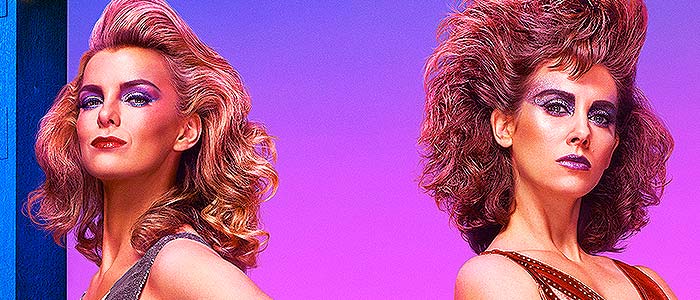
Feminism has become fashionable. In Hollywood, women are becoming more visible as they are given more diverse and leading roles. Recent releases like Ocean’s 8 (2018), Ghostbusters (2016), and Wonder Woman (2017) have made nearly $1 billion collectively in theatres (total figured after accounting for film’s budget). Similar trends can be seen in television. Netflix’s series, G.L.O.W (Gorgeous Ladies of Wrestling), is also riding this #MeToo wave, but it deviates from the other examples above for several reasons. While popular blockbusters are making more roles for actresses, these movies are often reimagined reboots of highly successful franchises with the leading men swapped out with leading women with not much difference to plot or theme. The changes many want to see in Hollywood have yet to take hold permanently, but GLOW is a step in the right direction— away from feminism ‘in-word-only,’ and towards something more genuine. This article will explore how Season 1 of GLOW is among the most productive of these #MeToo era works, why superficial content is doing well, and why that may be an issue. It will conclude by highlighting GLOW’s exceptionality, and why it should be a template for media to come.
Support For
GLOW is a TV show set in 1980’s Los Angeles. It follows Ruth Wilder, an actress who cannot seem to get a break. A casting agent finally tells her about an audition for “unconventional women,” and it turns out to be G.L.O.W, the Gorgeous Ladies of Wrestling. The rest of the series follows Ruth and the other wrestlers as they try to make a successful wrestling show. The series shows many complex characters; Ruth and Debbie are best friends, but Ruth has an affair with Debbie’s husband (which is an underlying theme throughout both seasons of the show so far), and how they each handle these events shapes who they are. Sheila is another excellent example; we learn that she wears a wolf fur and a black wig because she identifies more as a wolf than as a person. Sam, the director of G.L.O.W and one of the main male leads, seems a flat, sexist burn-out, but grows into a sometimes caring, passionate artist.
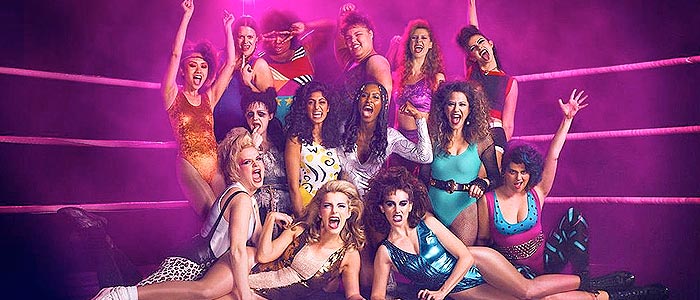
Perhaps the reason why there are so many complex characters—especially women characters—is due to the various ways in which the series represents empowerment. Empowerment can be defined as the ability of an individual to represent who they want to be to the world. Often women in film are used as objects to be acted on, lusted after, and looked at, and are so often fetishized, leading to voyeurism (Mulvey, 1999). In GLOW, the characters feel empowered differently; some find confidence in their wrestling costumes, for example, while others have more intrinsic confidence. Ruth, for example, is always empowered. She is not shy about who she is, and often makes a fool of herself to stay true to who she is. In the first episode of Season 1, Ruth gets cut from auditions for G.L.O.W. All that night, she watches Hulk Hogan reruns and practices comedically extravagant wrestling moves in her studio apartment. The next morning, she parades into the wrestling gym where auditions are still happening and acts out scenes and moves from the night before in an outlandish cape and leotard, complete with glitter face paint and yellow rubber cleaning gloves with the fingers cut off. Throughout the whole performance, Ruth is in control and is representing her authentic self even though she’s acting out a ridiculous persona.
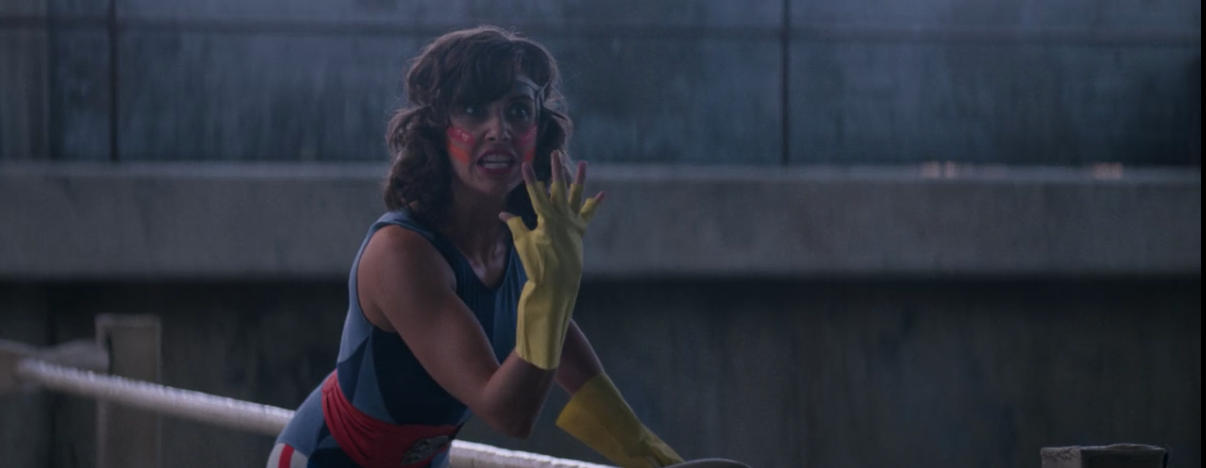
Debbie and Sheila are two other interesting examples of empowerment. It seems that Debbie only feels empowered when she’s in costume and character, and Sheila is the same way, except she wears a costume virtually all the time. Debbie’s personal life soon falls apart. After her husband cheats on her, she soon realizes that she is not in control of her own life; her husband and baby son both rely on her to fulfill certain roles, but she loses her identity in the process. Being in G.L.O.W gives her a new sense of purpose and identity. Sheila, on the other hand, states many times throughout the series that she is not playing a character with her wolf attire; she truly identifies as a wolf. This becomes apparent when Ruth becomes roommates with Sheila, and Ruth discovers that Sheila goes through a long process every day to look the way she wants to. The series points this out with a montage at the beginning of S1E4, showing Sheila wigless and in a bathrobe, her natural, short blonde hair slicked back as she applies dark makeup to her face and teeth (Mensch, 2017). The cast of G.L.O.W is made up of seemingly misfit and outcasted women; people whom society has rejected or does not make room for.
GLOW is all about women’s identities and struggles within a one-size-fits-all society, and the show works through these issues of identity through wrestling. Like most TV shows and films, GLOW sets up each of its characters to hold certain traits, linking them with a specific trope: Ruth is the headstrong ingénue, Sam the tortured artist, Debbie the all-American greedy housewife, Cherry the street smart “heavy,” and Sheila the quiet yet misunderstood eccentric sage. Although GLOW uses these archetypes to help the audience keep everyone straight, it constantly complicates the characters. This is in direct contrast to most of the women’s wrestling characters, which are often racist stereotypes; Fortune Cookie, Beirut, Welfare Queen, Britannica, Junk Chain, and Liberty Bell all borrow from Asian, Muslim, African American, British, and American stereotypes. The themes of identity are complex and in GLOW, especially when looking at them from a feminist perspective. In the first episode, Ruth is described by both herself and a casting agent as unconventional, unique, and real, traits those who make the comments apparently do not often see in women. Similar to Mulvey’s critique on film and visual culture, women are objects—things to be looked at and from which male characters and viewers derive pleasure. In GLOW, women occupy the same role—demure, pretty things for the enjoyment of men. Further, for married women like Debbie, their only value comes from creating life. Mulvey recognizes this phenomenon as well, noting that “women aren’t actual people—the closest they can get is giving birth, for they do produce someone who has personality and origin; value” (Mulvey, 1999). Christian Metz suggests something similar, presenting the idea of scopophilia; the pleasure of looking (Metz, 2001). Metz suggests that film is only viewed through this lens of pleasure. This presents a tricky model for feminist works to work in.
Yet the women portrayed in GLOW achieve individuality and character, despite and in direct opposition to these supposed tendencies. Indeed, this grappling with type and convention is written into the core of the show; the women are not just wrestling each other, they are fighting their way through the patriarchy and male gaze in order to act out their authentic selves. In a word, they are fighting to become empowered. This overarching theme is even vocalized on-screen by G.L.O.W’s producer, Bash: “You’re wrestling your own stereotypes” (Mensch, 2017).
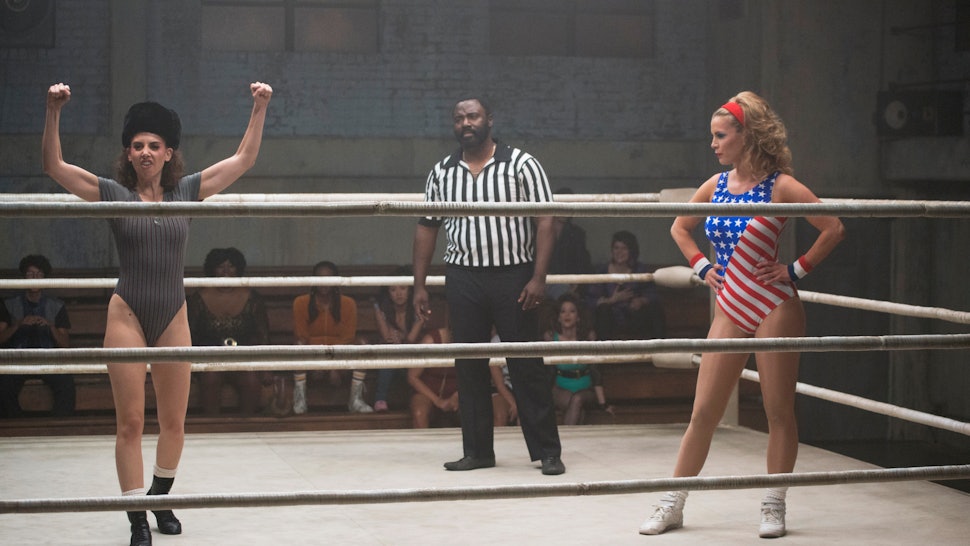
There are entire episodes that tackle these issues, like S2E4 wherein Tamme Dawson, who plays Welfare Queen, visits her son at Stanford (Mensch, 2018). Tamme wrestles with telling her son about her job and her alter ego, because on the one hand, she loves the empowerment and freedom it brings, but she also sees her performance as racist and denigrating to her as a black woman. Another example is Arthie as Beirut, who is constantly unsatisfied with her character, lamenting that Indians are only recognized as doctors or terrorists. In the end, some of the wrestlers are happy with their characters, while others—like Arthie—strive to beak free.
Mulvey also argues that the locus of power in film is the gaze or the persona/ point of view the camera takes. The gaze of the camera can be linked to the gaze of the eye; it follows the action and reproduces it faithfully, but just as individuals take these images and construct meaning around them, so, too, does the cinema eye. Often films take the point of view of the director or filmmaker(s). Mulvey notes that the male gaze is the Hollywood default. This perspective makes women into objects of desire and pleasure, and men become the center of the filmic universe. The gaze holds power, and the male gaze enacts this power upon women. The gaze of the camera forces the audience to identify with certain characters; in her article, Mulvey notes that in Hitchcock’s Rear Window, the audience is forced to identify with Jeff (James Stewart), the male protagonist (Mulvey, 1999). Mulvey goes on to comment that men desire sole power over the gaze and to control women because they are afraid of castration (ibid.). The male gaze is so engrained in popular movies that it is often hard to identify, but when it is absent, there is a definite shift in mood. GLOW has little if no trace of the male gaze. Especially in its first season and first few episodes, the women are not sexualized. Even during scenes with nudity, there is no innate objectification. The filmmakers create a story that allows women the dignity of their own gaze, harnessing their own power.

Critique Against
If GLOW represents an advancement of film and television supporting a feminist view, there have been many works in the recent past that have not done as well. Most recent examples include the films mentioned previously (Ghostbusters, Wonder Woman, and Oceans 8) but also include other titles like, Pitch Perfect 3, Jurassic World, and Overboard. Films like these—with strong female characters—are everywhere in 2018, and there are plenty more on the way. While seeing so many complex leading women who are not there simply to look pretty is a large improvement, the trend is more malicious than what it seems. The fact that all but one of these “feminist” reboots derive from popular franchises is one indication that all is not as it seems. These trends may be doing well financially due to their female protagonists and connection to the #MeToo movement, but they may also be doing well because they’re riding off the success of previous, male-led franchises. In the wake of major sexual harassment allegations on some top players, Hollywood is backpedaling hard, but their efforts—while not entirely bad or malicious—have been misdirected. These cookie-cutter films may help satiate the public’s need to see powerful and confident women in charge, but the characters and stories they tell are flat and trite. Oceans 8 was basically Oceans 11, but with women. Ghostbusters almost mirrors the original Ghostbusters; but with women. Replacing male characters with women is simply window dressing—the narratives are all still male-dominated— and does nothing to address the deeper gender gap and power dynamics.
This lack of new and diverse stories about and by women leaves much to be desired, but where Hollywood and these big-budget remakes fail, GLOW excels. Inclusion and diversity behind the camera does, in fact, have an impact in front of the camera. More than half of the six titles mentioned above were directed by white men, and nearly all were produced by white men. Other key positions like Unit Production manager, executive producer, writer, and cinematographer were also chiefly filled by men. While it is wonderful that stories are being told about women, the best and most productive change will occur when women are telling their own stories and those of other women. Mulvey suggests a similar approach; in order to dismantle the pleasure of looking in cinema, one must support diverse ways and means of digital storytelling: watch female-made cinema and invest time and money into non-Hollywood productions and works like art house and other media (Mulvey, 1999). In the case of GLOW, the co-creators of the story are both women, as well as key roles like director, editor, and cinematographer. Having more women on set has the potential of changing the atmosphere. Even though the principal cast is wearing nothing but leotards for a majority of the series, Betty Gilpin (Debbie) talks about the impact and consequences of having so many women on-set;
“Being on a set with female bosses, the level of comfort and bravery I felt really made me reflect back on my whole career. My brain had taught itself to have a male gaze representative at the door, proof-reading ideas like a checkpoint: “Oh, that would make waves, don’t do that” or “That choice is a little too big…” Our set can feel like this sort of protected, feminist bubble where you get to trot out your bravest, most-empowered self for free.”
Brie, 2018
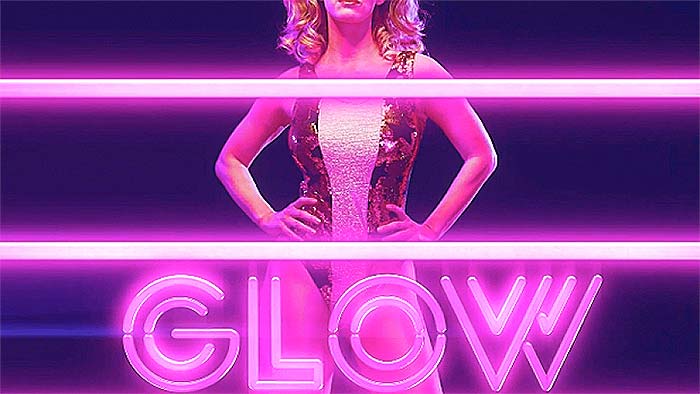
For the actors, the environment is supportive and non-threatening. Even though they are vulnerable physically, emotionally and mentally, they are united because of the number of women coming together to tell women’s stories. Similarly, Brie’s comment highlights the differences between a typical male-dominated set and one that is female-dominated. In attempting to create more meaningful and powerful narratives, encouraging spaces where actors feel the most in control and creative is beneficial for the actors and the final filmic product.
Lately, cultural changes and attitudes spurred on by the increase of feminist discourse in the public eye and the #MeToo movement have been reflected on the big screen. Blockbusters like Oceans 8 and Ghostbusters have done extremely well for themselves, much in part thanks to these cultural waves and their inclusion in popular, male-dominated franchises. The stories being told through these “feminist” pieces are not women’s stories; however, they are simply men’s stories re-packaged to look like women’s stories in order to ride these new cultural waves and sell more tickets. Work like GLOW goes against the status quo of mediocrity and in the end creates meaningful work, even art. Looking at GLOW through the theories of Laura Mulvey emphasizes the importance of the work the cast and crew is engaged in while making it. There is little to no inclusion of the male gaze, the women shown are empowered in different ways, and it explores complex identity and human relationships/emotion. In a series like GLOW, feminism is not just a fad or a passing fancy. The issues emphasized by feminism and the #MeToo movement affect everybody involved, including the audience. Inclusive productions like these raise the bar of filmmaking and call for others to follow suit.
Works Cited
- Brie, Alison. “‘GLOW’ Co-Stars on Breaking Gender Rules — and Bones — in Season 2.” Interview by Betty Gilpin in The Hollywood Reporter, July 3, 2018.
- https://www.hollywoodreporter.com/live-feed/glow-season-2-alison-brie-betty-gilpin-interview-1124630.
- Metz, Christian.Psychoanalysis and Cinema: The Imaginary Signifier. New York, NY: Palgrave, 2001.
- Mulvey, Laura. “Visual Pleasure and Narrative Cinema.” Film Theory and Criticism: Introductory Readings. Eds. Leo Braudy and Marshall Cohen. New York: Oxford UP, 1999: 833-44
- Still photos by Erica Parise / Netflix.
What do you think? Leave a comment.











Your article answers the question of whether or not James Bond should be female. (Basically, no.)
A good essay. I started watching this series, this essay might help me to think about it differently. Sometimes that is what you want out of an essay that addresses deeply a series on television–a different perspective.
The interesting thing about GLOW is that it’s set in the 1980s but was made just a few years ago. I wonder how much of the characters’ discussions about their empowerment and the roles they have to play is meant to reflect the culture of the 1980’s, and how much is meant to reflect modern culture.
Though I have not seen the series GLOW, this article in the way it is articulated makes me want to watch it if I could make time.
This article brings to light the problem that feminism has changed into by some that participate using #MeToo along with many other trending terms.
Unfortunately the word feminism is judged because of the collective behaviour by women using these trending terms. It’s somewhat like the boy who cried wolf.
As a woman who has personally been through many sexist and sociocultural excepted and pressured behaviours I questioned my identity for years.
I aspire to be a woman of worth in feminism that is actually representing change in culture and acceptance and real equality. But then I see women who has been hurt and And some women who are using the # and the trend as part of the years new pop culture.
I applaud this article because it sheds light on what we are perceiving as feminism. Pop culture and many other influential media platforms and people has altered the messages in the imagery and film industry and people are not questioning it they are assuming that it is the right way of feminism.
It was inevitable.
Thank you for your interesting discussion, I particularly valued your final discussion of the threats present in the response to current “female power” presentations in Hollywood. I agree that we are still a long way off seeing genuine female storytelling, but as always it is unsurprising that TV is leading where film is still just stagnating.
GLOW was an utter delight, without planning to I ended up binging it in one sitting. Wonderfully cast, laugh out-loud funny and surprisingly poignant, GLOW was so, so much better than I expected based on the premise.
It’s a fantastic series. Loved watching the first series with my kids, although hearing them sing the GLOW rap is starting to get a bit much.
You should see the original Glow rap. Lasts forever!
Not enjoying the second season nearly as much as the first after watching the first five episodes. The acting, music, etc is all class but way too many SJW moments and liberal agenda shoved in your face. Hollywood just can’t stop doing that and with this seasons storylines it’s obvious this show has become more about agenda than entertainment. I still think it’s a good show it just would probably benefit from more subtlety and comedy.
What’s the agenda that you’re choking on here exactly?
Absolute belter of a show. Looking forward to seeing the 3rd season this weekend. A show apparently about women’s wrestling in the 80s is not something that would normally appeal to me, but it’s much deeper and funnier than that. Relationships, empowerment, attitudes and individuality are all there. A real hit for the Netflix recipe of deep pockets, creative freedom and top talent. And great to see Kate Nash in the ring. It took me half a season to realise it was her, but she’s brilliant and enjoying a second career in the US.
I loved the first two seasons of glow. Yet to watch the third one.
It’s a really good show, Alison brie is not given the recognition she deserves. Often the way with good actors, it’s almost as though they do too good a job and you forget they’re acting at all. Another example of this would be Chris Bauer (the wire, trueblood, the deuce), anyone who can be a stevedore, pimp and sherif of a town populated by vampires and be believable is a great actor.
Love this show. The episode in the first series where they learn to wrestle properly is magic. Great cast with great chemistry.
The scene between Sam and Justine, when she asks “do you want to make out again? Just kidding!” and he goes from fright to beaming with paternal pride, is one of the most twisted and delicious laughs I’ve ever had watching television.
I just adored it. I expected some emotional moments but not the absolute roller coaster inthe final two episodes. I whole body sobbed a few times.
5 episodes in and it’s ‘kin brilliant. Brie’s character is fantastic in an irritating, grating, unlikeable way. Some people are saying it’s better than Stranger Things, they are not in any way comparable because Stranger Things is weird as shit (in a good way), but it’s up there in terms of quality.
GLOW was one of my favourite surprises: entertaining, intelligent, witty – but not obsessed with snappy, sarcastic comebacks as so many shows and films are at the moment – and gloriously 80s.
You missed a good opportunity to talk about Mythologies. Wrestling takes pride of place after Citroën. And Barthes would have taken to Brie, like Brie.
This is a very well-written and thorough piece. I enjoyed your focus on female empowerment, and how you highlighted not only the feminist messages in GLOW, but also thoughts on the #MeToo movement and inclusion. Thank you for sharing this with us!
Binged it all yesterday after reading this and thoroughly enjoyed it. Good story, well told. I thought Kate Nash was excellent, hadnt seen her act before. Marc Maron was great too.
GOT without dragons or medieval settings? I’m in.
Really good show, brings out the classic wrestling style where the Wrestlers wrote their stories and promos. Mother Russia!!!!
Looking forward to a full-on binge watch of GLOW. Thanks for bringing it to my attention.
Alison Brie is one of the most naturally talented and versatile actresses working in Hollywood but at the same time she’s been underrated and hasn’t really got enough opportunities to do justice to her full potential.
I didn’t think my life could get any gayer but … GLOW! 😀
In the 80’s I watched Gorgeous Ladies Of Wrestling for a while. Does anybody know if it ever aired on UK TV?
Cracking show – Super fun. Will be smashing through this one in a matter of days.
A good essay. Enjoyable and insightful, good writing.
Great handling of a sensitive topic.
Thank you for posting this interesting article for us. I am really happy to see more works centred on Women shown to the public. Women’s power needs to be seen.
Great read! I’ve passed on this show for a while despite Netflix’s suggestions because I wasn’t sure whether it was strictly performative (haha) in its feminism or actually sincere. This article convinced me to give it a shot. Cheers!
I think it’s interesting to address the progress that GLOW hasn’t made in comparison to mainstream films in then past years such as the new ghostbusters. I think recently, Harley Quinn: Birds of Prey is a good example and it was through Margot Robbie taking a stance and Cathy Yan as director. It’s definitely important for film to show female stories rather than remakes. But also, to remain skeptical of minimising the male gaze to transform the norm thang is currently set upon society.
Definitely will be watching GLOW after reading this.
Just on Ocean’s 8, I have never seen any of the other films in the franchise (and frankly I wont ever see them) and ONLY watched this one due to its female ensemble cast. I know for a lot of women, young girls especially, it is definitely empowering to see a cast like that. Regardless of the franchise’s predecessors.
This was very insightful, and I might just consider watching GLOW as a result!
Thank you for this commentary! I feel like critiquing feminism in media can be difficult, but this article handled it beautifully. Definitely adding GLOW to my to-watch list!
This made me want to finally watch GLOW ! Very well written and insightful